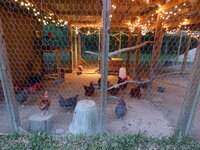MiaS
Songster
I have just about ready to lay pullets and I'm wondering if I must have additional light in the coop for their first winter? I don't care so much about getting maximum egg production for their first winter and can't help but wonder if it is just better to let them have a natural low light winter?
Here in the North we will only get about 8-9 hours of daylight mid-winter. After reading @Alaskan's article about surviving winter suggesting that birds need 10 hours just to get enough food, I'm now second guessing.
Here in the North we will only get about 8-9 hours of daylight mid-winter. After reading @Alaskan's article about surviving winter suggesting that birds need 10 hours just to get enough food, I'm now second guessing.





